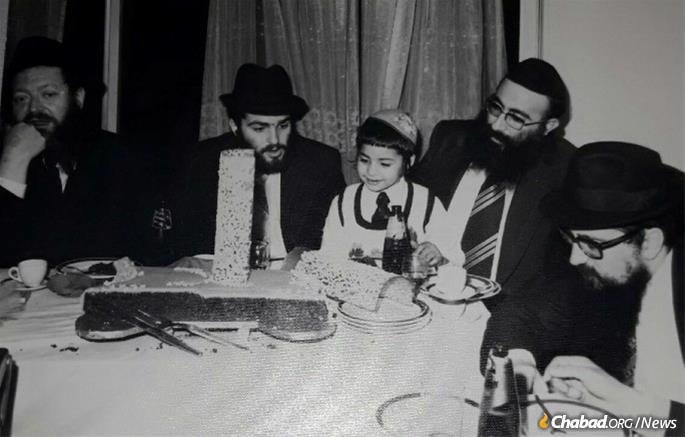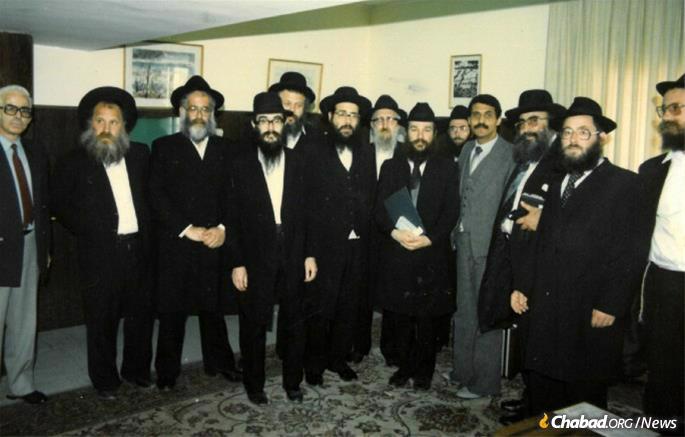
Obituary: Rabbi Shimon Elituv, 86, Senior Member of Israeli Chief Rabbinate
by Menachem Posner – chabad.org
Standing in the ancient home of Maimonides in the old Jewish quarter of Cairo in 1985, a group of rabbis had come from around the world to mark the first completion of the worldwide annual study of Mishneh Torah, the magnum opus of the great philosopher and codifier of Jewish law, who was the city’s chief rabbi and personal physician to Saladin the Great.
The spokesman of the group, handpicked by the Rebbe—Rabbi Menachem M. Schneerson, of righteous memory—was Rabbi Shimon Elituv, whose flowing Arabic was often broadcast on radio and television across the Arab world.
Throughout his long, distinguished rabbinic career, he was in close contact with the late Rabbi Ovadia Yosef and Rabbi Shalom Mashash, and other Sephardic rabbinical leaders in Israel. He would often recall the joy Rabbi Yosef expressed when he told him that he concluded that mikvahs built with one cistern upon another (a layout favored in Chabad) was ideal.
“He was quiet and did not waste words,” said his son, Rabbi Yitzchak Yosef, the Sephardic Chief Rabbi of Israel. “And when he would speak, everyone would listen!”
Elituv passed away on Wednesday, Jan. 25 (3 Shevat), in Israel. He was 86 years old.
Scion of Sephardic Rabbinic Families
Shimon Gad Chaim Elituv was born in 1937 in the Old City of Jerusalem to Rabbi Yosef Rachamim Abitbul, a blind Torah scholar, the son of Rabbi Meir Abitbul of Casablanca and Shoshanah, a scion of the rabbinic Elbaz family, also of Morocco.
Growing up on Habad Street, he was surrounded by the leaders of the Sephardic community, including the future chief rabbi of Israel, Rabbi Mordechai Eliyahu, who was a close family friend.
Living across the street from the Chabad-Lubavitch Tzemach Tzedek synagogue, which gave the street its name, he grew up listening to the heartfelt Chassidic melodies wafting from the synagogue, especially in the waning hours of Shabbat. “The synagogue nourished our souls,” he recalled in an interview with JEM’s “My Encounter With the Rebbe Project.” “We are a musical family, and the music we heard from the synagogue gave us so much.”
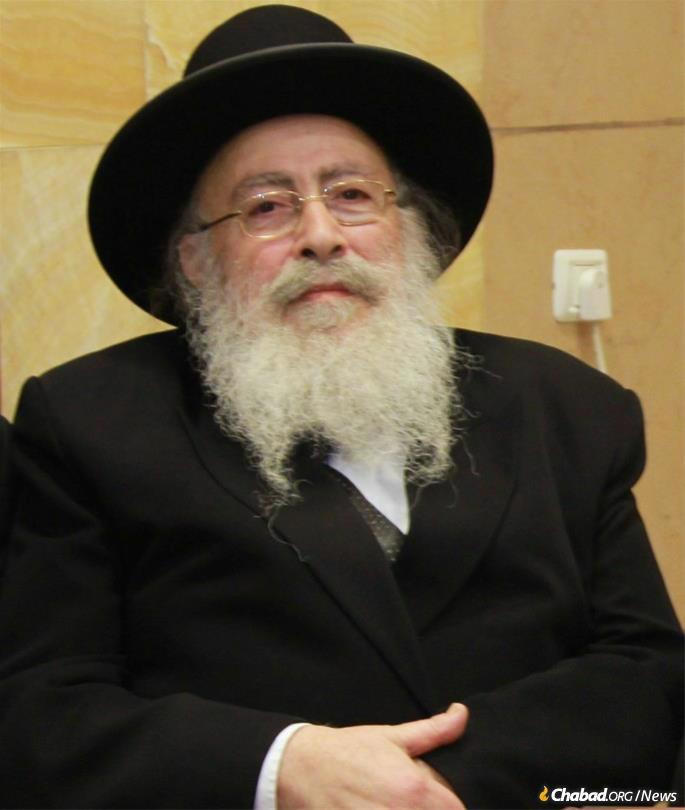
Braving Blockades and Daily Violence
In the months leading up to the 1948 War of Independence, life in the Old City became increasingly dangerous, and teachers stopped coming to teach in the Porat Yosef Yeshiva where the Elituv boys studied.
Braving the blockades and daily violence, Shoshana Elituv took her son to Hadera, where she enrolled him in the local branch of the Novardok yeshivah, where he remained for five years. Novardok was a Polish strain of the Mussar-oriented yeshivah system that placed a strong emphasis on self-abnegation and austerity.
After five years, he was influenced by his elder brother Meir to study in the Chabad yeshivah in Lod. “I was received warmly at the Chabad yeshivah,” he has said, “even though I had come from a very different background than most of the other students, who were primarily the sons of Chabad families from Russia.”
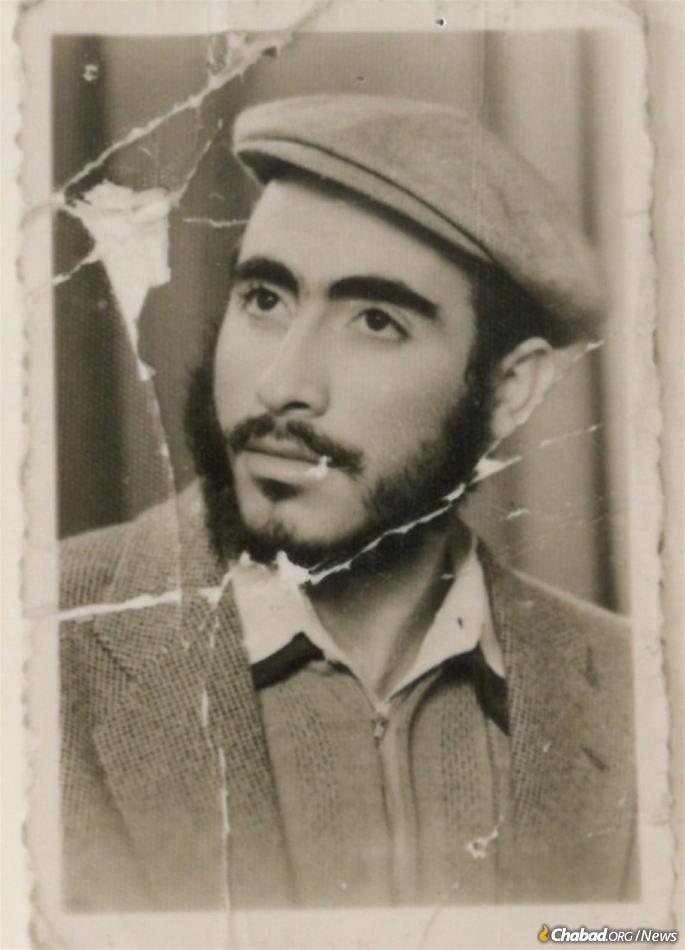
Four Decades of Correspondence With the Rebbe
He soon began corresponding with the Rebbe, something that would continue for nearly four decades, with Elituv receiving more than 100 letters in total.
In later years, when the Rebbe was receiving shopping bags of mail each day and it had been some time since the Rebbe had written to him, he stopped writing so as not to burden the Rebbe. The Rebbe then wrote to him: “Your silence … is surprising, and it saddens me that you are making a calculation—based on the lack of letters from here—that I am loaded with burdens and troubles, etc.”
Needless to say, he resumed writing to the Rebbe.
As a Chabad yeshivah student, he got involved in various educational programs for local youth outside the hours of formal study, teaching Chassidism in the synagogue of the legendary rabbi of Ramle and spiritual leader of Israel’s Moroccan Jewish population, Rabbi Yitzchak of Abuchatzeira, known as the Baba Chaki.
At one point, a photographer came to the yeshivah to take pictures of all the students. Upon seeing Elituv’s photo, the Rebbe replied: “I was pleased to see the photograph, especially since it strengthened my opinion that if you will want to devote your energy to the field of education, you will succeed.”
Upon his engagement to Mazal Buskila in 1958, the Rebbe saw to it that their apartment was furnished and that the wedding—a modest but joyous affair held in the Chabad yeshivah in Lod without a band or photographer—was sponsored by generous donors.
In the first years of their marriage, the couple were busy teaching in Chabad’s Oholei Yosef Yitzchak network—first in Kiryat Gat and the primitive desert settlement of Brosh and then Kfar Chabad.
As their family grew, the rabbi spent three years in Romania and Yugoslavia, where he served as a shochet (“ritual slaughterer”) providing kosher meat for the local Jews. As a dedicated Chassid, he used the opportunity to teach Torah and have a positive influence on the locals, especially the youth.
He took this to the next level when he became a shochet in Argentina, where he became the spiritual leader of the Sukkat David synagogue, which had a membership primarily of Jews from Syria. Under his leadership, it became a large bustling center of Jewish life and Torah study.
In 1974, he came to New York and was privileged to meet the Rebbe in person for the first time. The Rebbe gave him many pointers for strengthening Jewish life, including utilizing his knack for language. In addition to serving the Arabic-speaking Sephardic community, the Rebbe encouraged him to maintain a regular column in the local Yiddish newspaper. He also gave Torah classes in Spanish, Arabic and Yiddish over the radio.
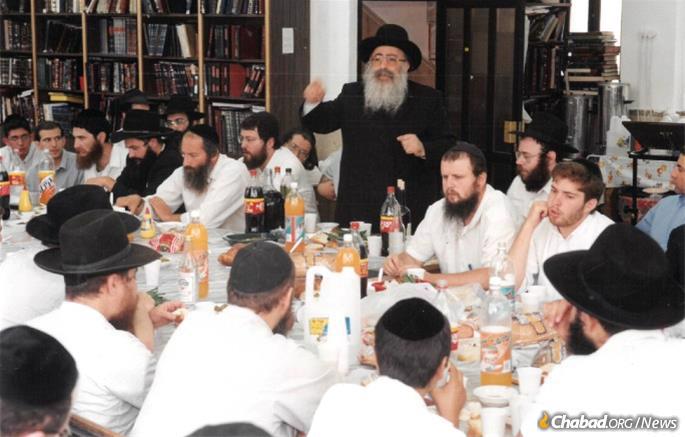
“Wherever he went, his whole life was devoted to raising up his students,” commented former Ashkenazi Chief Rabbi of Israel and Chief Rabbi of Tel Aviv, Yisrael Meir Lau. “There were many of them, and he invested tremendously in each one.”
After 10 years in Argentina, the couple returned to Israel, where their children were in school. There, he became director of the Sephardic yeshivah maintained by his cousin, Rabbi Reuven Elbaz, before founding a yeshivah of his own, Or Meir (or Oz Meir) in memory of his brother Meir, who passed away in a car accident at the age of 33.
“For him to connect and uplift a fellow Jew was the ultimate accomplishment,” recalled Rabbi Elbaz. “This is what I took from him, all with love and with joy.”
Or Meir, which catered to young men who were not succeeding in the traditional yeshivah setting, offered courses on safrut (“sacred calligraphy”), shechita and milah (“ritual circumcision”). While working on subjects that had clear practical application, the young students thrived and were open to significant spiritual growth. And after sending an emissary to test the students, the Rebbe agreed to have the school listed as a Chabad institution.
Together with his wife, he also led an institute for young women from disadvantaged backgrounds, primarily from Sephardic families. Mrs. Elituv cared for their social needs, and the rabbi would teach them Torah.
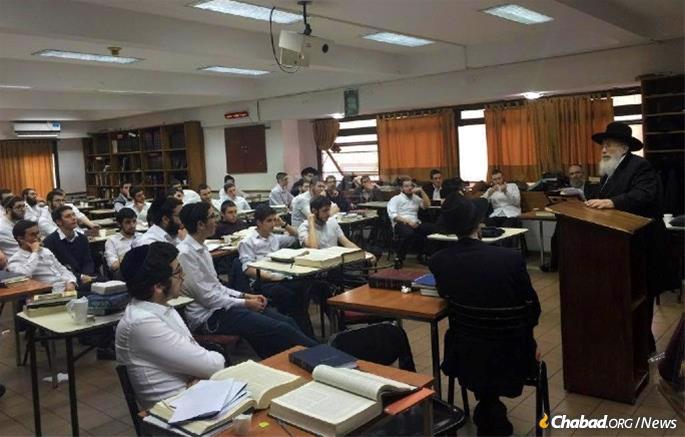
A Master of Languages
For years, the Egyptian commemoration of the completion of the Mishneh Torah was an annual ritual, in which Elituv took a central role.
In order to prepare for his speeches, which were often broadcast on local radio and television, he studied the local Egyptian dialect of Arabic, which was different from his native Moroccan dialect.
His knack for languages and for connecting with people was noted by former Chief Rabbi of Israel and current Chief Rabbi of Jerusalem, Shlomo Amar, who recalled: “I asked him to accompany me to Kazakhstan several times. With people from Iran, from Egypt, he spoke to all of them in their language.”
Concurrent with his educational endeavors, he was appointed to several rabbinic posts in Jerusalem.

Following a second stint in Argentina in the early 1990s, he returned to Jerusalem, where he reopened his yeshivah and kollel in the Sanhedria neighborhood. In 1998, he was appointed rabbi of the Mateh Binyamin region. His varied other rabbinic posts include serving as vice president of the Chassidic Chevra Kadisha (burial society) of Jerusalem.
In 2009, he was invited to take a seat on the council of the Israeli Chief Rabbinate, where he was a respected voice representing both the Sephardic and Chassidic perspective on many issues.
In 2012, he was invited to serve as chief rabbi of Mevaseret Zion, a suburb of Jerusalem with a population of nearly 25,000.
Despite his pressing communal burdens, he remained accessible, greeting everyone from young children to tzedakah collectors with genuine warmth and personal interest.
In addition to his wife, he is survived by their children: Rabbi Saul Moshe Elituv (Kfar Sitrin), Rabbi Yossi Elituv (Beitar), Nechama Asulin (Hadera) and Shterna Sarah Shweke (Kiryat Malachi); as well as many grandchildren and great-grandchildren.
